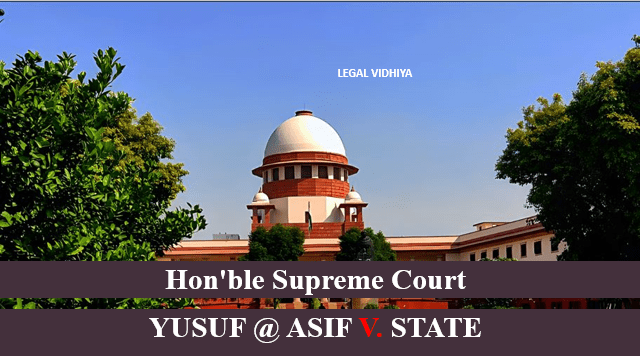
| CITATION | CRIMINAL APPEAL NO. 2191 OF 2023 |
| DATE OF JUDGMENT | 13 October, 2023 |
| COURT | SUPREME COURT OF INDIA |
| APPELLANT | YUSUF @ ASIF |
| RESPONDENT | STATE |
| BENCH | ABHAY S. OKA J, PANKAJ MITHAL J |
INTRODUCTION
The Supreme Court has acquitted Yusuf alias Asif, who was found in possession of 20 kgs of heroin. The decision was based on the revelation that the trial was compromised, as the contraband samples were not drawn in the presence of a Magistrate, and the inventory lacked proper certification. The Court upheld Yusuf’s appeal, overturning his initial conviction and the 10-year imprisonment sentence with a Rs One lakh fine imposed by the trial court and confirmed by the High Court
FACTS
Acting on intelligence received by the Narcotics Control Bureau, a lorry near Puzhal Central Jail, Chennai, was intercepted on 28.03.2000. Four individuals were discovered in possession of a commercial quantity of 20 kgs of heroin. Samples were drawn, and the substance was seized under a Mahazar. Following an analyst report confirming the substance as heroin, all four were arrested, convicted by the trial court under the Narcotic Drugs and Psychotropic Substances Act, 1985, and sentenced to 10 years of rigorous imprisonment with a fine of Rs.1 lakh each.
One of the accused, A-4 (Ganesh Ram), passed away during the appeal process, resulting in the abatement of his case. The High Court, in its judgment and order on 11.10.2022, upheld the trial court’s findings, directing the accused to serve the remaining sentence after adjusting the period already undergone. A-1, the owner of the contraband, has now appealed against his conviction and sentencing. It’s noteworthy that A-1 orchestrated the transportation of the contraband from Madhya Pradesh to Chennai with the assistance of A-2 to A-4, and A-1 was present at the seizure location to receive the contraband upon its arrival in Chennai.
CONTENTION OF THE APPELLANT
The appellant submitted that the entire process of seizure and sampling is inherently illegal. He asserts that this action violated the mandatory provisions of Section 52A(2) of the NDPS Act, as the prescribed procedure for drawing samples and seizing the alleged narcotic substance was not adhered to. Furthermore, he raises a substantial doubt regarding the accuracy of the samples sent for analysis, questioning whether they truly represented the seized contraband.
CONTENTION OF THE RESPONDENT
The learned counsel representing the respondent on behalf of the State argued that the search and seizure were based on prior information received by the Intelligence Officer of the Narcotics Control Bureau (NCB), identified as PW1. The accused individuals were informed of the officers’ identities, and with their written consent, the search was conducted in the presence of Superintendent of Police, NCB (PW8), a gazetted officer. Following the seizure, two samples from each packet were drawn, packed separately, and sealed with NCB Seal No.12, with the correct seal number recorded in the Mahazar and all related documents, except for the godown receipt where, inadvertently, Seal No.11 was mentioned. The officers involved in the search, seizure, and arrest operation duly submitted their report as required under Section 57 of the NDPS Act.
JUDGEMENT
Despite the defense presented by the respondent, the record lacks evidence to confirm compliance with the mandatory provisions of Section 52A(2), (3), and (4) of the NDPS Act during the seizure and sample drawing process. Notably, the samples were drawn in the presence of a gazetted officer, not a Magistrate, and there is no proof that the Magistrate certified the inventory or the list of drawn samples.
Referring to the precedent in Mohanlal’s case, the apex court emphasized that the correct procedure involves forwarding the seized contraband to the officer empowered under Section 53, who must prepare an inventory and seek certification from the Magistrate. Samples drawn in the Magistrate’s presence, along with the certified list, constitute primary evidence for trial. With the absence of material verifying the presence of the Magistrate during sample drawing and the certification of the seized contraband’s inventory, the seized contraband and its samples lack validity as primary evidence. Consequently, the entire trial is compromised. Therefore, considering the failure to provide primary evidence, the conviction of the appellant is set aside. The appellant, having already served more than 6 years of the 10-year sentence, is granted exemption from surrender. The appeal is allowed with no order as to costs.
CONCLUSION
Without documented evidence confirming that the samples of the seized contraband were drawn in the presence of the Magistrate and that the inventory of the seized contraband received proper certification from the Magistrate, it becomes evident that the seized contraband and the associated samples lack the necessary validity as primary evidence in the trial.
Written by Ratna Singh an intern under legal vidhiya.
Disclaimer: The materials provided herein are intended solely for informational purposes. Accessing or using the site or the materials does not establish an attorney-client relationship. The information presented on this site is not to be construed as legal or professional advice, and it should not be relied upon for such purposes or used as a substitute for advice from a licensed attorney in your state. Additionally, the viewpoint presented by the author is of a personal nature.




0 Comments